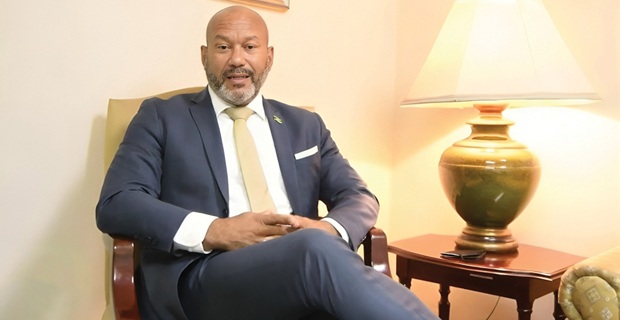“Partners in Progress”
In a candid and insightful conversation, H.E. Jason K. M. Hall, High Commissioner at the Jamaican High Commission in New Delhi, speaks to Bula Devi, Consulting Editor (International Affairs), India Empire, about the evolving contours of Jamaica–India relations. With shared historical ties and a future-forward agenda, both nations are deepening their bilateral cooperation across diplomacy, trade, energy, education, and culture. The High Commissioner sheds light on key strategic initiatives and outlines Jamaica’s vision for engaging India as a trusted and strategic partner
High Commissioner, how would you describe the current state of India–Jamaica bilateral relations? What are the key areas of engagement today?
Jamaica and India share a historic connection spanning over 180 years, originating with the arrival of Indian indentured labourers to work on sugar cane plantations. Diplomatic relations were formally established shortly after Jamaica’s independence from Britain in 1962 and have remained robust for over 75 years, marked by collaboration both bilaterally and multilaterally—within the UN, G77, NAM, and The Commonwealth. Both countries are aligned in their vision to reform these institutions, making them more representative, accountable, and responsive to the realities of the 21st century.
Our bilateral ties are currently at their peak, exemplified by the establishment of the Jamaican High Commission in New Delhi in 2019 and the landmark visit of Prime Minister The Right Honourable Dr Andrew Holness to India in 2024. India has consistently been a valued development partner, particularly in climate resilience, technology, medical services, and traditional medicine, especially AYUSH. Jamaica deeply values India’s global contributions. Strategically positioned, Jamaica now serves as a gateway for Indian investment and innovation into the wider Americas—especially in energy, logistics, manufacturing, mining, digital services, pharmaceuticals, medical services, and creative industries. Engagement focuses on raising awareness of Jamaica’s value proposition in India and promoting exchanges at multiple levels—G2G, B2B, G2B, P2P and, uniquely, H2H (Heart to Heart).
What are some of the key strategic objectives of the Ministry/GOJ that the Jamaican High Commission in India is focused on achieving? How do these objectives shape your daily operations?
Our strategic objectives include:
- Enhancing political cooperation and strengthening bilateral relations.
- Increasing multilateral engagement through bodies such as the International Solar Alliance (ISA) and the Coalition for Disaster Resilient Infrastructure (CDRI), among others affiliated with India.
- Expanding technical, economic, educational, and cultural cooperation to build resilient and sustainable sectors capable of broader economic contribution, especially within the knowledge economy.
- Rolling out the Economic Diplomacy Programme (EDP), which highlights Jamaica’s investment value and targets Indian Direct Investment (IDI) in key sectors—digital services, agriculture/agri-processing, tourism, alternative energy (solar, green hydrogen), logistics, healthcare/pharmaceuticals, creative industries, sport development, and education (especially STEM through the MTECH programme).
The High Commission acts primarily as a facilitator—sourcing leads, sharing information, and promoting Jamaica across a broad spectrum.
Trade and investment are often central to diplomatic ties. What sectors offer the most promise for deeper economic collaboration between Jamaica and India?
amaica produces premium, high-value products such as our world-renowned Blue Mountain Coffee and Jamaican Rum—both Geographically Indicated, with strong appeal in India’s luxury market. Trade in services is also promising given our geographic proximity to the Americas and the wider Caribbean.
However, investment remains our major selling point. Jamaica boasts a strong FDI success rate, a business-friendly environment (ranked highest in ease of doing business), robust sea, air, and road infrastructure, and significant international connectivity. Priority sectors for investment include energy, logistics, manufacturing, mining, digital services, pharmaceuticals, medical services, and especially creative industries like film.
Jamaica has been making strides in renewable energy and sustainable development. Are there any ongoing or upcoming partnerships with India in this domain?
Jamaica is a committed member of the ISA and is actively engaged with Indian companies interested in solar, wind, hydro, and biofuels (including switchgrass). Through our National Vision 2030 programme, Jamaica targets 50% renewable energy in its energy mix by 2030—about 520 megawatts. Active projects in wind, solar, hydro, and biofuels reflect our commitment to a sustainable future.











Comments.